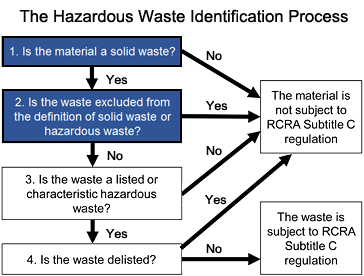What Does Reclaim Waste Do?
The 25-Second Trick For Reclaim Waste
Table of ContentsIndicators on Reclaim Waste You Need To KnowReclaim Waste for BeginnersReclaim Waste - QuestionsThe Basic Principles Of Reclaim Waste 6 Simple Techniques For Reclaim Waste
With correct fluid waste administration, firms can lower energy-intensive therapy procedures and disposal expenses. By adhering to a system for taking care of fluid waste, companies can stay clear of pricey fines and penalties and stay clear of negative promotion.(https://experiment.com/users/reclaimwaste1)Collect representative examples from various factors within the waste stream to make sure precision. Liquid waste, particularly harmful ones, poses substantial risks during this action.

Disinfection (e.g., chlorination, ultraviolet light, ozonation) and nutrient removal (e.g., denitrification and phosphorus elimination) are recommended under rigid laws. Numerous business violated numerous liquid waste disposal guidelines in current years.
How Reclaim Waste can Save You Time, Stress, and Money.

are used by industries that generate big volumes of low-toxicity liquid waste. Shallow basins contain fluid waste that is enabled to evaporate via natural processes. The residue left can be gotten rid of in garbage dumps. entails burning liquid waste at high temperatures and converting it right into gas and ash. This kind of disposal is subject to strict environmental laws because of potentially dangerous exhausts.
The findings need to be documented, assessed, and stored not just for submission to regulative authorities but additionally for making renovations in the future. Usage reliable tools, methods, and software application remedies to make certain precise and constant data collection. Remain updated on pertinent ecological laws and market requirements. Share info with pertinent stakeholders (e.g., staff members, regulatory government agencies, and nearby communities) to keep transparency and responsibility.
No matter the firm size or market, there are numerous difficulties connected with this task. Comprehending these can assist them successfully manage their procedures and lessen their environmental impact. makes it difficult to treat and get rid of fluid waste securely. Firms that can not spend in centers need to take into consideration working together with the general public sector for much better options.
See This Report on Reclaim Waste
By executing extensive management systems that consist of treatment and reusing strategies, routine tracking, threat evaluations, and adherence to local and government regulations, industrial centers can add to the protection of groundwater materials, ensuring their availability for future generations (liquid waste disposal melbourne). Let's dig into the significance of effective fluid waste monitoring in the industrial market, concentrating on its implications for protecting groundwater resources
The contamination of groundwater sources as a result of inappropriate liquid waste monitoring in the industrial sector has significant effects for human health, farming, and the setting as a whole. Some of the potential impacts triggered by such pollution consist of: Contaminated Alcohol consumption Water Products: As groundwater provides a significant portion of our alcohol consumption water, air pollution from commercial activities can bring about hazardous chemicals and microbes entering our water systems, presenting health and wellness dangers for people.
Reduced Agricultural Productivity: Agriculture depends heavily on groundwater for irrigation; as a result, polluted water can prevent plant yields, contaminate agricultural products, and affect food security. Given the importance of protecting groundwater resources, it is vital for organizations to take a positive position in handling their liquid waste properly and avoiding pollution.
The Greatest Guide To Reclaim Waste
Fluid waste can contaminate land and contaminate waters. Under the Security of the Atmosphere Workflow Act 1997, organizations that produce fluid waste are called for to handle it in a method that safeguards the setting and the community. Details regarding managing and storing liquid waste, responding to spills explanation and reducing liquid waste is available in the following reality sheets and advice:.
The role of waste management experts in securing this precious source can not be overemphasized. Polluted water and polluted effluent management: Making sure that unsafe liquids are securely eliminated and treated prior to they can damage our water resources.
Therefore, integrating sustainable liquid waste administration into financial preparation enhances financial security and shields the setting, showing the value of this strategy. In conclusion, adopting professional liquid waste management practices is essential for making certain a sustainable future, securing our environment and protecting the well-being of future generations.
When it pertains to getting rid of waste, sticking to proper procedures is crucial for a wide variety of factors. Correct waste disposal is not almost tidiness; it has to do with making certain the well-being of our environment, health, and the reliable use resources. Understanding the significance of efficient waste administration can help all of us add to a healthier, cleaner earth.
More About Reclaim Waste
Reliable waste administration helps maintain clean streets and public spaces, decreasing the aesthetic effect of trash and making certain that waste does not damage wildlife. When waste is not gotten rid of correctly, it can result in contamination, where unsafe substances can leach right into the dirt, water supply, and the air, creating lasting environmental troubles.